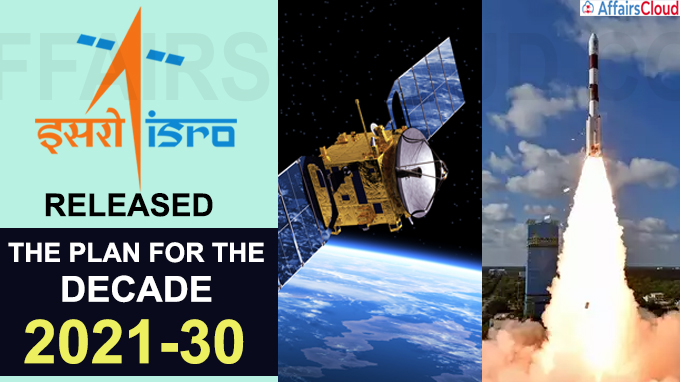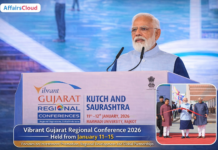 Sivan, Secretary of Department of Space (DoS) & Chairman of Indian Space Research Organisation (ISRO) has chalked out the plan for the Decade 2021-30. It has listed both Short-term vision & Long-term visions. The plan envisions the development of heavy lift rockets, reusable satellite launch vehicles & semi-cryogenic engines.
Sivan, Secretary of Department of Space (DoS) & Chairman of Indian Space Research Organisation (ISRO) has chalked out the plan for the Decade 2021-30. It has listed both Short-term vision & Long-term visions. The plan envisions the development of heavy lift rockets, reusable satellite launch vehicles & semi-cryogenic engines.
Short Term vision:
i.In the short term, ISRO has plans to execute diverse missions which are
- First Developmental Flight of the Small Satellite Launch Vehicle (SSLV) planned to be launched in March, 2021.
- Operational Geo-Imaging capability, which is expected to be launched in 2021.
- Chandrayaan-3 – Third Lunar Mission of ISRO expected to be launched by late 2021 or early 2022.
- Aditya-L1 – First Solar Mission of ISRO, It is expected to be launched in 2022.
- Launching of the First Indian Data Relay Satellite System (IDRSS). It is a planned constellation of Inter-satellite communications satellite expected to be launched in early 2021.
ii.The Gaganyaan Programme India’s First unmanned flight is set to be launched in 2022.
Overall Space Policy:
i.The essential aspects of overall space policy required for facilitating space system development & operation in the country are in final stages of drafting.
ii.The aspects include Specific Satellite Communication Policy, remote sensing data policy, space transportation systems policy.
iii.The overall space policy will help in guiding and supporting the implementation of Space Sector reforms.
iv.The main focus will be towards self-reliance and global leadership in space systems.
Research & Development Activities:
i.The research and Innovation investment in India is 0.69% of Gross Domestic Product (GDP) which is low compared to 2.8% of the United States of America, 4.3% in Israel & 4.2% in South Korea.
ii.ISRO spends 22% of its budget for R&D activities.
Achievements of last decade (2011-20):
i.The ISRO has stated that the last decade consisted of many maiden missions in almost all verticals of ISRO. Some of the are
- Operationalization of GSLV (Geosynchronous Satellite Launch Vehicle) with Indigenous Cryogenic Stage
- Operationalization of GSLV MkIII Launch Vehicle.
- Launch of Mangalyaan – Mars Orbiter Mission.
- AstroSat – 1st dedicated Indian astronomy mission to study celestial sources in X-ray, optical & UV spectral bands simultaneously.
- Launch of Indian Regional Navigation Satellite System – NavIC.
- Launch of GSAT-11, India’s heaviest and most-advanced high throughput communication satellite.
- Technology demonstration missions of winged body Reusable Launch Vehicle & Scramjet engine.
Disruption of Space Sector & Future:
i.ISRO has also stated that the entry of private players is disrupting the Global Space Sector.
ii.Private players are targeting cost-effective space transportation systems & on-demand delivery of space-based services through satellite constellations.
iii.New Technologies like Artificial Intelligence & Machine Learning are being used to achieve the next generation of space systems.
iv.The satellites are also playing a major role in building the 5G ecosystem and Internet-of-Things (IoT).
v.The Government of India has also announced a dedicated Indian National Space Promotion & Authorization Center (IN-SPACe), to promote and foster the Indian private players to take part in the space programme.
Sector wise Plans for the Decade:
Every Centre of ISRO has come out with a decadal plan. Some of them are
i.Vikram Sarabhai Space Centre (VSSC) – To Achieve partial & full reusability of Rockets.
ii.Liquid Propulsions Space Centre (LPSC) – To Achieve the high thrust semi cryogenic propulsion capability, to boost Geosynchronous Transfer Orbit (GTO) payload capability to 5.5 tonnes. It has also set aim to focus on Methane propulsion, Green Propulsion & Electric Propulsion.
iii.Space Applications Centre (SAC) to complete indigenization efforts for Indigenous Atomic Clock and Travelling Wave Tube Amplifiers (TWTA).
Click here to read the Full Decade Plan
Recent Related News:
i.On 25th August 2020, ISRO signed a MoU with VSSUT, Burla, Odisha to set up the first of its kind innovation cum incubation centre, VSSUT Space Innovation Centre(VSSSIC) in India to promote space research.
ii.ISRO has set up ‘NETRA’ – an dedicated Space Situational Awareness (SSA) Control Centre at ISTRAC (ISRO Telemetry, Tracking and Command Network) Campus at Peenya, Bengaluru, Karnataka.
About Indian Space Research Organisation (ISRO):
Chairman – K. Sivan
Headquarters – Bengaluru, Karnataka




